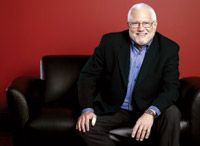Al Topin, Topin & Associates
We need to start thinking of digital as part of a marketing plan instead of The Plan.
Big Pharma doesn't hire big agencies purely because of cost efficiencies. There's more to it than that. Sometimes companies choose their partners because there's a perception that a big "established" agency with global recognition is better and safer. If a brand succeeds, they can share in the glory. If a brand fails, they can find comfort in knowing that they didn't choose an unknown company. To them, size does matter. It helps mitigate risk.

At times digital marketing seems more like a bunch of tactics looking for a cohesive strategy. We need to start thinking of digital as part of a marketing plan instead of The Plan and build the relationships with our stakeholders first before considering relationships with patients.
Retro reasoning
It's too bad this type of thinking still exists. Perhaps ten to fifteen years ago there was some truth to this. But no longer. Technology and strategic alliances are great equalizers. They give independent agencies the ability to compete on the same level as large holding companies. We can deliver innovative thinking, creativity, and success just as well as the large bureaucratic giants. We can offer a team of senior people around the globe, nimbleness, and enthusiasm that can't easily be duplicated by a large bureaucratic system.
Topin and Associates been serving as the lead agency for several of its global clients and turning to its member partners for support and execution. For these clients, it didn't matter that we were not part of a large public bureaucracy. What mattered was that we helped deliver impact for their brands with high passion, energy, and efficiency.
Perceived value and customer experience are precisely what branding is all about. The customer's relationship with the brand—whether it's at the level of the healthcare professional or at the patient level—includes interaction with the sales force, the product, and obviously, the effects and results that the product delivers.
An alliance is so much stronger
More and more pharmaceutical and healthcare companies are approaching product launches on a global basis. Technology and digital marketing has helped make this possible, according to Tony Chant, founder of the Eurocom Healthcare Communications Network.The alliance offers global clients choices. No longer are they limited to a small group of networks. Now they can choose to select a holding company with affiliates, or a partnership of nimble agencies. Both types of affiliations demonstrate their strengths and opportunities and leverage their "feet on the ground" in various markets. With a level playing field, clients can choose which type of network is best for their brands.
Established in 1996, the European Network figured that there was stretch in numbers. Each member has an opportunity to build strong global brands while remaining independent, flexible, creative, and efficient. What began as one or two companies blossomed to many member agencies. The full-service Network's presence reaches across the UK, France, Germany, Spain, Italy, Austria, and the U.S. Members share a kind of singularity of focus.
Addressing Disparities in Psoriasis Trials: Takeda's Strategies for Inclusivity in Clinical Research
April 14th 2025LaShell Robinson, Head of Global Feasibility and Trial Equity at Takeda, speaks about the company's strategies to engage patients in underrepresented populations in its phase III psoriasis trials.
Beyond the Prescription: Pharma's Role in Digital Health Conversations
April 1st 2025Join us for an insightful conversation with Jennifer Harakal, Head of Regulatory Affairs at Canopy Life Sciences, as we unpack the evolving intersection of social media and healthcare decisions. Discover how pharmaceutical companies can navigate regulatory challenges while meaningfully engaging with consumers in digital spaces. Jennifer shares expert strategies for responsible marketing, working with influencers, and creating educational content that bridges the gap between patients and healthcare providers. A must-listen for pharma marketers looking to build trust and compliance in today's social media landscape.
Asembia 2025: Therapy Advancements Highlight Growing Cost and Access Concerns
April 30th 2025Fran Gregory, VP, emerging therapies, Cardinal Health, discusses the evolving cell and gene therapy landscape, highlighting pipeline growth, cost challenges, and emerging therapeutic areas beyond oncology and hematology.